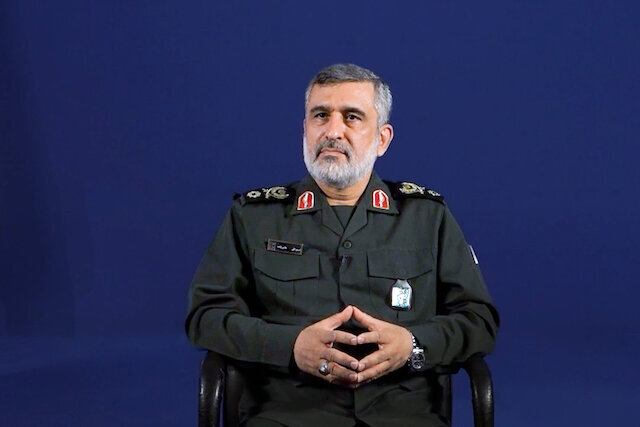Interview with Martyr Hajizadeh reveals Leader’s instrumental role in missile program

TEHRAN – Experts and analysts believe that Iran’s missile program was what saved the country from the devastating fate the U.S. and Israel had devised for it in the lead-up to the war that began on June 13.
Israel and its American patron believed they could topple the Iranian government and wreak chaos inside the country by targeting top military officials and hitting military, nuclear, and civilian infrastructure in surprise attacks. Not only did they fail to achieve this objective, but they were also forced to ask for a ceasefire after both Israel and the United States came under attack from sophisticated and powerful Iranian missiles. Hebrew media reports indicate that around 50,000 buildings in the occupied territories have sustained damage. One-third of Tel Aviv is destroyed or damaged, according to independent media claims.
One of the instrumental figures in the development of Iran’s missile and drone program is Amri Ali Hajizadeh, the late commander of the Islamic Revolution Guard Corps (IRGC) Aerospace Force who lost his life in Israeli strikes during the initial hours of the war.
However, Martyr Hajizadeh himself credits the Leader of the Islamic Revolution Ayatollah Seyyed Ali Khamenei for this spectacular development in a 2021 interview. The interview was published on Tuesday by the Office for the Preservation and Publication of Ayatollah Khamenei’s Works. It was to be included in the "A Tale of Victory" dossier, analyzing Iran’s strategic triumphs in regional conflicts.
At the beginning of the interview, Martyr Hajizadeh, detailed how Ayatollah Khamenei’s leadership shaped the country’s defense strategy, particularly in missile technology. He emphasized that Iran’s self-sufficiency in arms production—despite decades of sanctions—was a direct result of Ayatollah Khamenei’s decisive interventions.
One pivotal moment came in the 1980s when Iran, engaged in the Iran-Iraq War, had only a handful of missiles. Despite urgent battlefield needs, Ayatollah Khamenei, then president, insisted on reverse-engineering two missiles to jumpstart domestic production. "This was an extremely difficult decision," Martyr Hajizadeh recalled. "But the Leader’s foresight laid the foundation for our missile industry."
Martyr Hajizadeh revealed that in the early 1990s, after the Soviet Union’s collapse, Iran was offered advanced Russian missiles at bargain prices. While military officials pushed to buy them, Ayatollah Khamenei "became angry" and forbade the purchases, insisting on indigenous development. "Had we bought them, our progress would have stalled," Martyr Hajizadeh admitted.
Today, Iran ranks among the world’s top drone manufacturers and missile developers, with precision-strike capabilities showcased in operations like the 2020 Ain al-Asad base attack, the fight against ISIS, and finally, the recent war with Israel. "The enemy admits we’ve taken away their air superiority," Martyr Hajizadeh said, citing U.S. military acknowledgments.
Martyr Hajizadeh also credited the Leader with steering Iran clear of foreign traps, such as during the Gulf War when some officials advocated siding with Saddam Hussein. "Only the Leader recognized it as a trap," he said. Similarly, Ayatollah Khamenei’s order to intervene in Syria against ISIS prevented battles "from reaching Tehran."
The interview also highlighted Ayatollah Khamenei’s hands-on role in defense policy, from prioritizing missile accuracy over speed to restricting IRGC’s focus to missiles while leaving aircraft development to the army.
"Our power isn’t borrowed—it’s built here," Martyr Hajizadeh said. "If officials follow the Leader’s strategies, no enemy can break us."
Leave a Comment